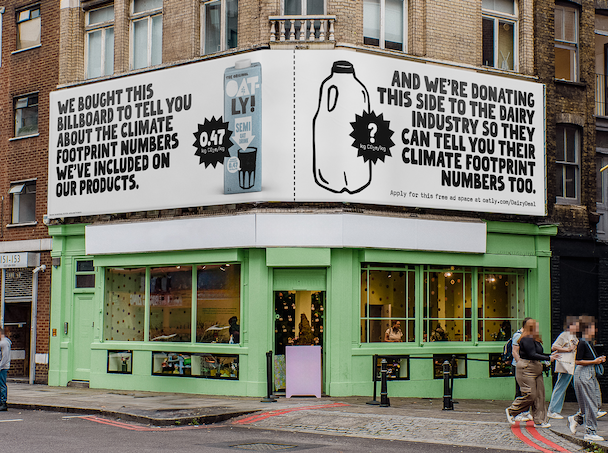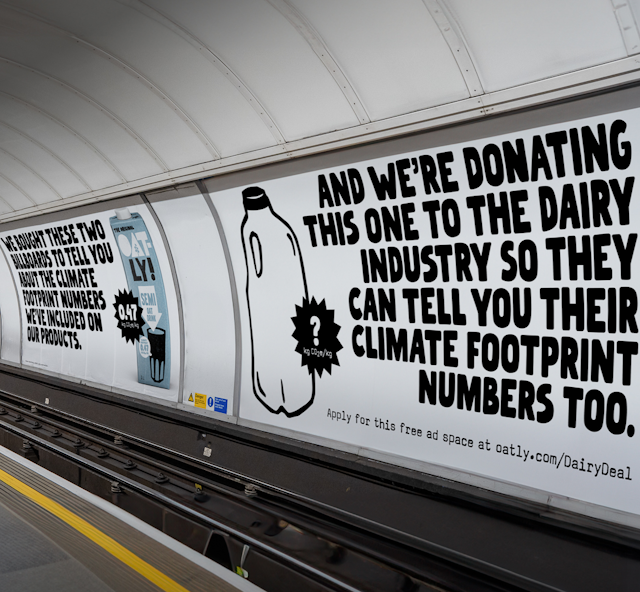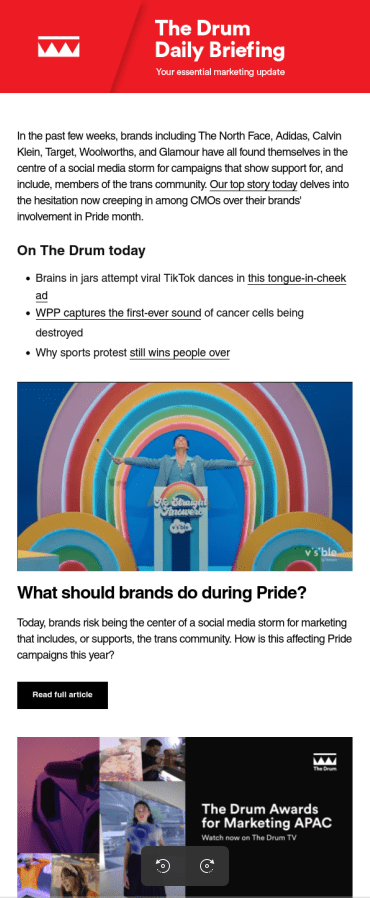Why Oatly wants all food and drink brands to show the climate footprint of products
The alternative dairy brand wants greater transparency on the climate impact of our diets, saying it feels like an ‘outlier’ with its own commitments.

The food system accounts for 35% of the UK's overall GHG emissions / Oatly
Swedish oat drink brand Oatly has included labeling disclosing the climate impact of all its products in the UK since 2019. Now, it wants to share the lessons it’s learned with other brands by launching a campaign calling for all UK food and drink companies to follow its lead and publish the climate footprint of their products.
It follows the release of new research by the brand, which reveals that UK consumers strongly support the idea of carbon labeling on food and drink.
Advertisement
To highlight the campaign, Oatly has also publicly challenged the dairy industry to reveal its climate numbers so that shoppers can make a truly like-for-like comparison. Oatly has paid for high-profile advertising space and offered it to ‘Big Dairy’ for free if they publish the full climate footprint of their products.
The brand ran the same campaign in the US earlier this year, though Oatly’s creative director Michael Lee tells The Drum: “No one took us up on the offer – perhaps unsurprisingly.”
Would climate labeling work?
Emissions from the food system currently account for 35% of the UK’s total greenhouse gas emissions. Dietary changes would deliver environmental benefits at scale, but currently, this is lacking from brand and governmental communications, says Lucy Hopkins-Parkinson, head of communications at Oatly.
“We’ve just had all of our UK party conferences, and despite food accounting for a third of all emissions, it was certainly not something discussed in any great detail, despite it being one of our greatest opportunities to hit net zero targets.
Advertisement
Lee explains that the campaign forms an important part of Oatly’s broader climate marketing strategy, differentiating it as: “A company that does not shy away from talking about the things that are important to us.”

“We could certainly spend our time trying to sell more oat drink but I think what makes us interesting and endearing to our consumers and fans is that we act like a leader – as cheesy as that sounds.”
He says while the idea of climate labeling initially came from Oatly’s creative team, it was easy to get the wider company on board and is something the brand has been championing in other markets for some time.
In Germany, for example, Oatly petitioned the Bundestag to include mandatory climate labeling on food and drink products. Together for Carbon Labeling, a consortium compromising of Oatly alongside Hello Fresh, Veganz, Aestlé, Frosta and Erdbär was later born and invited to speak to the parliament, though this was delayed due to Covid.
Suggested newsletters for you
“The broad stroke argument is, if we can have nutritional labeling on food so we can make better choices for our health, then the same should be done for the health of the planet,” says Lee.
Hopkins-Parkinson expresses the desire for other brands to join forces with Oatly in the UK with this campaign. “We know that our way of doing carbon labeling may not be the ultimate solution, so we’re hoping that not just other plant-based food and drinks companies join us but retailers and a number of other brands too.”
What did the research find?
After surveying 2000 UK adults, Oatly found that 62% are in favor of a policy to introduce carbon labeling on food and drink products, and 55% think companies should be obliged to publish that information.
Most consumers (59%) say they would reduce or stop entirely consumption of high carbon footprint food and drink products if provided with accurate emissions data.
“So if six out of 10 Brits changed their eating habits, you can see how those numbers could actually equate to some pretty big changes,” Lee says.
Young people (18-34) are particularly engaged. 74% think food and drink companies should be obliged to publish the carbon information of their products. They are significantly more interested than other age groups in knowing the carbon footprint of their food and drink; more in agreement about the need for carbon labeling; and more likely to change their consumption habits.
What’s next?
To engage people on the initiative further, Oatly will be hosting a Reddit AMA on the platform and are calling for a dairy industry executive to join. “We hope someone will take up the offer,” Lee told The Drum.
The campaign’s use of OOH and print advertising intends to be equally provocative, he says, to improve awareness of “what is quite a dry subject that no one really wants to talk about.”
But he adds that the overall intention is to create societal change. “Snarky campaigns and advertising will only get you so far. The goal is to have everyone be able to make more informed choices about the foods they buy through mandatory climate labeling but right now, we feel like a bit of an outlier on this issue. It’s clear that not enough is being done about the climate emergency generally.”

